This Week in Anime
The Deer King's Beating Heart
by Monique Thomas & Christopher Farris,
The latest film from Ghibli alumni directors shares some themes with Princess Mononoke but proves it has the heart to stand on its own.
This movie is streaming on Hulu
Disclaimer: The views and opinions expressed by the participants in this chatlog are not the views of Anime News Network.
Spoiler Warning for discussion of the series ahead.
 @Lossthief
@Lossthief |  @BeeDubsProwl
@BeeDubsProwl |  @NickyEnchilada
@NickyEnchilada |  @vestenet
@vestenet |
Chris
Nicky, it seems like everyone has been going ga-ga over that new God of War game or HBO's The Last Of Us. So it's timely of us to dig out an anime installment focusing on a father-child connection. It could involve surviving a harsh wilderness or mysterious contagion for good measure.

Oh, deer...
Nicky, it seems like everyone has been going ga-ga over that new God of War game or HBO's The Last Of Us. So it's timely of us to dig out an anime installment focusing on a father-child connection. It could involve surviving a harsh wilderness or mysterious contagion for good measure.

Oh, deer...
Nicky
Oh deer, oh my, this week we're galloping away with the wonderful film, The Deer King!

With animation helmed by Production I.G., The Deer King is a stunning historical fantasy based on author Nahoko Uehashi's novel series of the same name. Uehashi, an author known for her blend of high fantasy and realistic beliefs and conflicts, is also responsible for writing The Beast Player and Moribito - Guardian of the Spirit series novels. Uehashi's work is no stranger to anime adaptions. Still, under the reigns of directors Masashi Ando and Masayuki Miyaji, The Deer King springs her concepts to life in beautiful feature quality.
Oh deer, oh my, this week we're galloping away with the wonderful film, The Deer King!
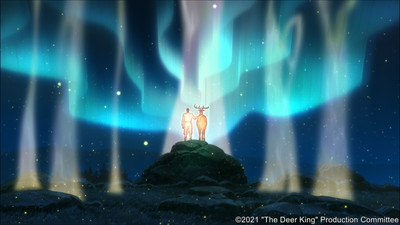
With animation helmed by Production I.G., The Deer King is a stunning historical fantasy based on author Nahoko Uehashi's novel series of the same name. Uehashi, an author known for her blend of high fantasy and realistic beliefs and conflicts, is also responsible for writing The Beast Player and Moribito - Guardian of the Spirit series novels. Uehashi's work is no stranger to anime adaptions. Still, under the reigns of directors Masashi Ando and Masayuki Miyaji, The Deer King springs her concepts to life in beautiful feature quality.
Ando previously made a name for himself, working on movies like Princess Mononoke and Spirited Away. I could feel The Deer King shooting for its version of that Ghibli style, though a little less generally family-friendly than that house is known for being. Hulu's stream throws up a warning, presumably for any parents thinking they might be throwing on another Ponyo.

Then the movie's opening segment makes it clear that things might be getting a little grisly.



Then the movie's opening segment makes it clear that things might be getting a little grisly.


Princess Mononoke is an appropriate comparison, given how that movie ALSO opens with some terrifying and violent imagery unsuitable for children. So yeah, listen to those warnings and avoid making the same mistake some parents did while browsing the isles of bygone Blockbusters in the streaming era.
But The Deer King strangely hits many of the same vibes as the preceding Ghibli classic in terms of tone, setting, and approach.
And not just in terms of both films featuring heroes who ride around on impressive horned mammals!

The Deer King deals with themes of encroaching colonialism and its environmental effects. Though this movie can feel more concerned with the human cost of conflicts like that, pointedly opening with our resistance leader lead, Van, captured and thrown into a slave labor camp.


It also throws in the complicating wrinkle of a mysterious illness ravaging the land unchecked, and oh, uh, when did they say this movie was originally released again?


The Deer King deals with themes of encroaching colonialism and its environmental effects. Though this movie can feel more concerned with the human cost of conflicts like that, pointedly opening with our resistance leader lead, Van, captured and thrown into a slave labor camp.


It also throws in the complicating wrinkle of a mysterious illness ravaging the land unchecked, and oh, uh, when did they say this movie was originally released again?

While I'm using my disc copy for this, it was an experience to watch this particular film fully masked in a theater (as I always do, nowadays) than in the comfort of my own home.


One scene early on features the current Zolian leader declaring his anti-vaccine sentiment on religious grounds right before he succumbs to the disease!


Subtle, The Deer King is not.
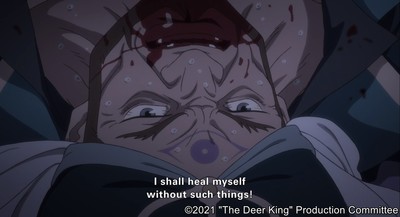

Subtle, The Deer King is not.
Though I will also note that commentary about disease and our current situation is a surface case of history repeating itself. Nahoko Uehashi's study as an ethnologist greatly informs her work. Cases of illness and war often go together. The Deer King profoundly focuses on the relationships between the imperial Zolians and the regional Aquafaesians, with the latter believing the disease to be divine retribution towards the Zolian people. The Aquafa, like Van and Yuna, seem mysteriously unaffected by it. In the middle, we have Hohsalle, a doctor working for the Zolian government who's just trying to figure it all out.

Possibly while flaunting his beautiful face and hair while doing so. Ando has been a character designer and animation director on many films. As the mentee of Ghibli's Yoshifumi Kondo, he has always had a great balance between realism and simplification regarding facial features.


Possibly while flaunting his beautiful face and hair while doing so. Ando has been a character designer and animation director on many films. As the mentee of Ghibli's Yoshifumi Kondo, he has always had a great balance between realism and simplification regarding facial features.

They're instantly recognizable sensibilities that gel well with Production I.G's usual style. Alongside Moribito, it makes a case for this studio's output being a strong adaptational fit for Uehashi's material, and I can see how Ando's involvement elevates that even if the character designs do make a significant mistake in having Van shave off his badass bushy beard in-between a brief time-skip.


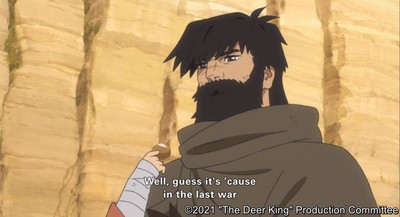

Look, if you had a small baby clinging to you at all times, you definitely don't want to keep any of those annoyingly grabbable face hairs!


Having rescued her from being eaten, Van takes the young Yuna as his daughter. The two find solace together in a nearby village composed of nice Aquafaesian and Zolian folk attempting to raise deer as viable livestock.

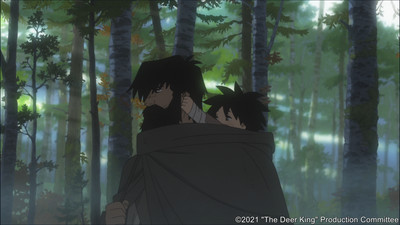
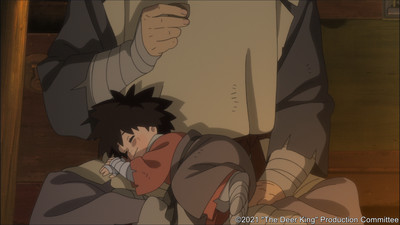
Having rescued her from being eaten, Van takes the young Yuna as his daughter. The two find solace together in a nearby village composed of nice Aquafaesian and Zolian folk attempting to raise deer as viable livestock.

It's places like this where this movie is at its best. Intimate, understanding views of fantasy life centered on a pair who could use that sort of escape. Plus, the lush musical montage scenes act as an understated counter to the occasional wordy stretches of exposition that can remind you too much that this was based on a whole series of novels they had to cram down into two hours.




I also like it because I find it unintentionally funny how the time-skip implies that resident badass tracker Sae spent several weeks or months wandering around the woods before she deduced that Van and Yuna went to this well-known village only a few hundred yards away from the prison they escaped.





I also like it because I find it unintentionally funny how the time-skip implies that resident badass tracker Sae spent several weeks or months wandering around the woods before she deduced that Van and Yuna went to this well-known village only a few hundred yards away from the prison they escaped.

Well, specifically, this is only the first novel, but regardless a version simplified for the film. However, it doesn't hurt the movie's pacing as most scenes are very in-the-moment and carried by the character acting. Even the very plot-heavy chess game between the king of Aquafa and his elderly right-hand man is brought into an easily-understandable emotional focus with the use of visual framing as they ponder whether it's worth sacrificing the innocent Van to further their own goals.


But this also applies to the relationship between Van and Yuna. Despite not having spent much time together and not having any blood relationship, their movement and acting feel very believable, so we don't doubt that they are each other's family.



But this also applies to the relationship between Van and Yuna. Despite not having spent much time together and not having any blood relationship, their movement and acting feel very believable, so we don't doubt that they are each other's family.

Any guy can be a baby girl, but it takes a real man to be a single mother. Sometimes that means piggyback rides and sometimes it means using your disease-unlocked curse arm to explode any feral hogs coming after your child.








Now that's what we call Pig Punching Power!
Van and Yuna's relationship is the heart of The Deer King, even when it's depicting that with so few words. Van's attachment was motivated because of his lost wife and kid, but it never feels like Yuna is an out-and-out replacement for them.


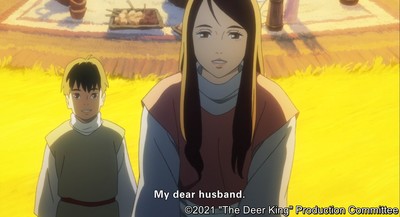

I think it also helps that Yuna is shown as a curious and intelligent little girl who's just happy to be loved by a parent despite being orphaned, given to a crazy lady in a slave mine, bitten by wolves, etc.


While I can see the framework there, and the relationship comes off as real, I don't know that Yuna herself ever clicked as an individual character for me. This isn't helped by her getting yanked away partway through to facilitate Van's journey for the rest of the story.

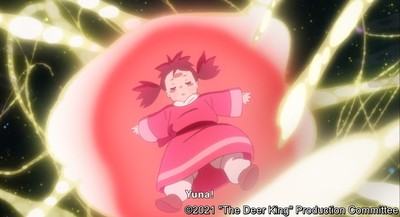
Van is not the only one who seems to have unlocked strange and mystical powers. Yuna also occasionally acts stranger than your average youngling. Van starts having strange visions of an old man. When wolves invade the village, Yuna gets possessed and taken away with the pack. Van chases her but is stalled by the tracker sent to find him. Hohsalle intervenes just in time to keep them from killing each other.

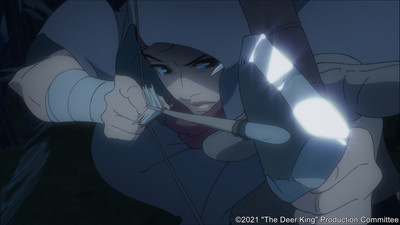
I can appreciate the simple irony in that overall setup, where the "Evil Empire" of Zol is trying to capture Van alive while those in charge of the conquered Aquafaese act as a nominal internal resistance trying to kill him.


In practice, it works to set up this story about our odd throuple traveling together to the big plot device village. Though on a thematic level, it's also here as an extension of The Deer King's articulations on colonialism, another component of which I find...fraught.


In practice, it works to set up this story about our odd throuple traveling together to the big plot device village. Though on a thematic level, it's also here as an extension of The Deer King's articulations on colonialism, another component of which I find...fraught.
I'll also remind everyone that Hohsalle is a contracted third party and the one most adamant about Van's survival, even if he claims it's just about taking his blood and not at all a product of bromance. He's still the character I would describe with the most goodwill and probably the closest to being an "objective" viewpoint for the audience.


Look, if the driving force of The Deer King is Van finding himself via found family, that has to include him opening up to dating again too.

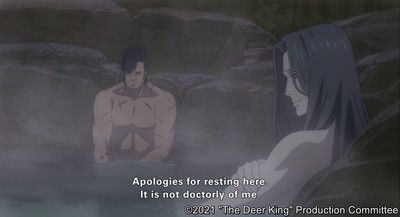
TFW you seduce two people to your viewpoint by giving your very touching single-dad monologue, and you all happen to be naked. Even Sai, who wanted to kill Van as a means of personal revenge against the Zolians who oppressed her, warms up to him.

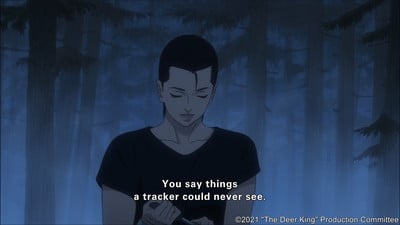
It's very effective at ingratiating us to our main characters, even if, for a hot second there, Sae's reactions made me think they would reveal that Yuna was her long-lost daughter.


It's more that Sae relates deeply to Yuna's position. Though, she could be a good mom to Yuna, given time.
Oh yeah, a direct relation is not necessary. The movie has some restraint and connecting these characters on the micro level works. I can particularly dig how Hohsalle gets to be effectively right about his belief in a hard medicinal counter for the mittsual. The 'religion' angle is more about him learning to treat other cultures as more approachable in that pursuit, even if the ultimate manner of the reveal made me guffaw out loud.
Nature and religion and how those are treated under imperialism are also huge parts of this. Many Aquafaesians seemed to have been kept or alienated from their native culture until Van's old crowd stepped in and caused an uproar, leading to his imprisonment. Zolians see many aspects of nature as "unclean" or strange, and it's clear that they have a more upper-class and industrial culture, similar to historical China. Despite this, many characters don't see their cultures as something that should divide them.


Okay, and this is where I can get into those "fraught" aspects regarding the film's approach to colonialism I mentioned earlier. I agree that cultural division should be overcome in integrated societies, but The Deer King doesn't do just that. Zol are active colonists and oppressors who only entered into any kind of treaty with the Aquafaese thanks to Van's uprising, for which he and others of that creed were thrown into a slave mine.




The movie tries to pull a "Why can't we all just get along" on the subject of those who, in living memory, subjugated another land because, "Hey, that was all in the past. We want to kiss some of them, and anybody who still feels oppressed should get over it, right?"






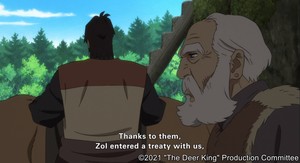

The movie tries to pull a "Why can't we all just get along" on the subject of those who, in living memory, subjugated another land because, "Hey, that was all in the past. We want to kiss some of them, and anybody who still feels oppressed should get over it, right?"




The film doesn't answer what the long-term solution for the two nations should be. But, I wouldn't say that Van's previous actions didn't have any positive outcomes as it was the reason some people were able to exist in harmony at all. Besides, the current prince, who takes over after the previous lord succumbs to disease, seems to have been quite inspired by Van.

There is also the meaning of the title, The Deer King, and what deer supposedly represent. Van gives a parable about a strong buck who stood up against dangerous predators but ended up wounded. This relates to himself. He follows by stating that he's not sure if it was actual bravery or stubborn foolishness led by the situation that caused the deer to act the way it did.

Deers are key symbols of nature, but so are wolves. Deers are herbivores, yet they are often revered as symbols of quiet and unyielding strength. It's different from being passive. While Van doubts his past choices, I wouldn't say it's externally framed as wrong. The Deer King frequently utilizes images of nature to wordlessly express the characters' internal conflicts throughout the film.

There is also the meaning of the title, The Deer King, and what deer supposedly represent. Van gives a parable about a strong buck who stood up against dangerous predators but ended up wounded. This relates to himself. He follows by stating that he's not sure if it was actual bravery or stubborn foolishness led by the situation that caused the deer to act the way it did.

Deers are key symbols of nature, but so are wolves. Deers are herbivores, yet they are often revered as symbols of quiet and unyielding strength. It's different from being passive. While Van doubts his past choices, I wouldn't say it's externally framed as wrong. The Deer King frequently utilizes images of nature to wordlessly express the characters' internal conflicts throughout the film.
Even as I disagree with the movie's flippancy towards addressing oppression, I can vibe with its use of natural elements as a low-key metaphor compared to something like Princess Mononoke's overt environmentalism (important messages that they all are). Like the idea that the mittsual, as a natural force, shouldn't be so casually used by the Aquafaese as their own culture has diverged enough that they could lose control of it? That's significantly more interesting than "If you use violence to drive out the Zol, you'll be just as bad as them."




Yuna's integration into that plotline, recruited as an unwitting bioweapon for the army of plague wolves, could work to illustrate those ideas about needing to maintain older cultural traditions as new families from multiple lines integrate.




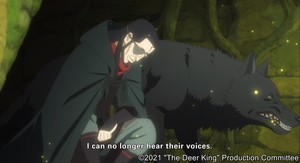
Yuna's integration into that plotline, recruited as an unwitting bioweapon for the army of plague wolves, could work to illustrate those ideas about needing to maintain older cultural traditions as new families from multiple lines integrate.

I also see it as Van maturing and finding peace with his feelings inside of him and Yuna as "survivors," the subtitle of the first book. It isn't a 1:1 metaphor for the disease, but at least for Van, his experience causes him to boldly stand up for the generations to come. He embraces the children who will continue to struggle with conflicts facing them in the form of a strong, protective, but kind role model. The film has excellent execution; it's a great film to let yourself be swept by its warmth.


As far as that execution, this is a great-looking film. There are a few ambitiously animated tracking shots throughout. And they get to show off a robust selection of environments across what feels like a comparatively brisk journey, like the varyingly snowy stretches or this cool muddy area populated by stilt-walking warriors.


While it's mostly dialogue scenes, the few action moments inject thrilling energy. The end, in particular, has some very satisfying bloody retribution.

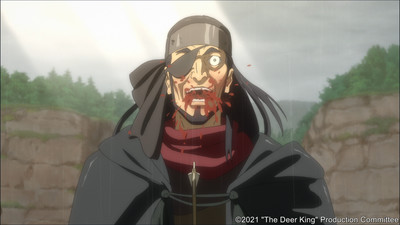
Hey, indulgences like that result in one of my absolute favorite moments in this movie.




I don't know if Ohfan getting immediately shot soon after by arrows like a dumbass was also supposed to be as intentionally funny, but it does line up with that stubborn deer metaphor you highlighted earlier.


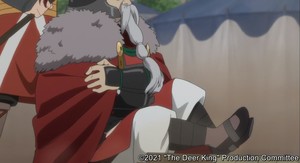


I don't know if Ohfan getting immediately shot soon after by arrows like a dumbass was also supposed to be as intentionally funny, but it does line up with that stubborn deer metaphor you highlighted earlier.

Yet somehow, the film remains refreshingly contemplative and open-hearted. There's a wide range of emotions. I was glad to be able to revisit what is a pretty dense film, and many will find it to be an emotionally satisfying and rich experience. You could many get lost in the trees a bit about what it all means as we did, but just from afar, the forest that surrounds The Deer King is awe-inspiring.


After hearing about this movie and its pedigree, I am glad I got to check it out. Ando's direction is effective across the gamut of the film's delivery styles, and the animation brought the A-game. So even as I was bouncing off of some of its thematic articulations or having some of its ending choices whizz by me, I can hardly say I was uninterested throughout. And that's the value of a piece like this landing on streaming platforms: you can check out and judge for yourself something that might be outside your normal seasonal anime purview.

Like the movie itself says, it's important to come into things with an open mind!


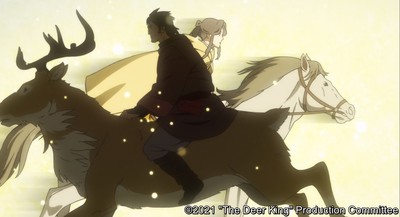
Like the movie itself says, it's important to come into things with an open mind!


discuss this in the forum (3 posts) |